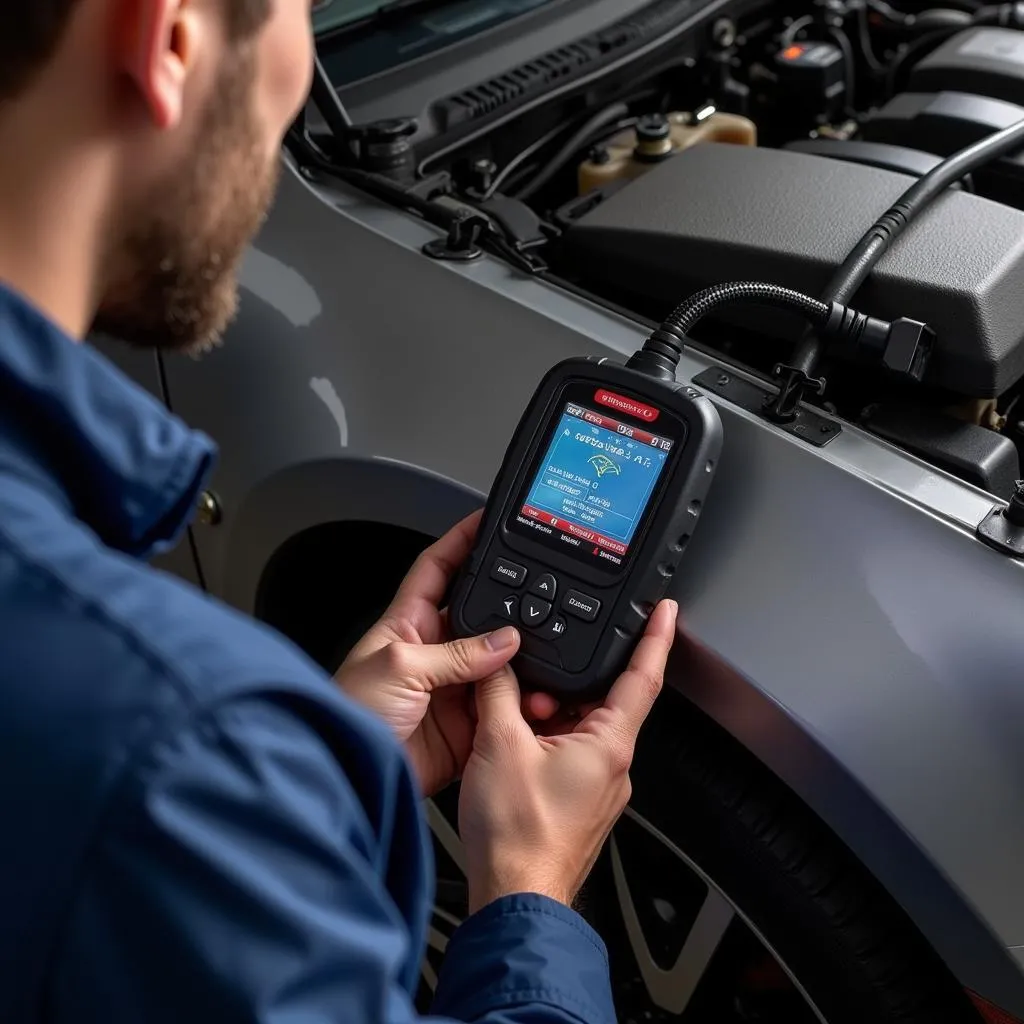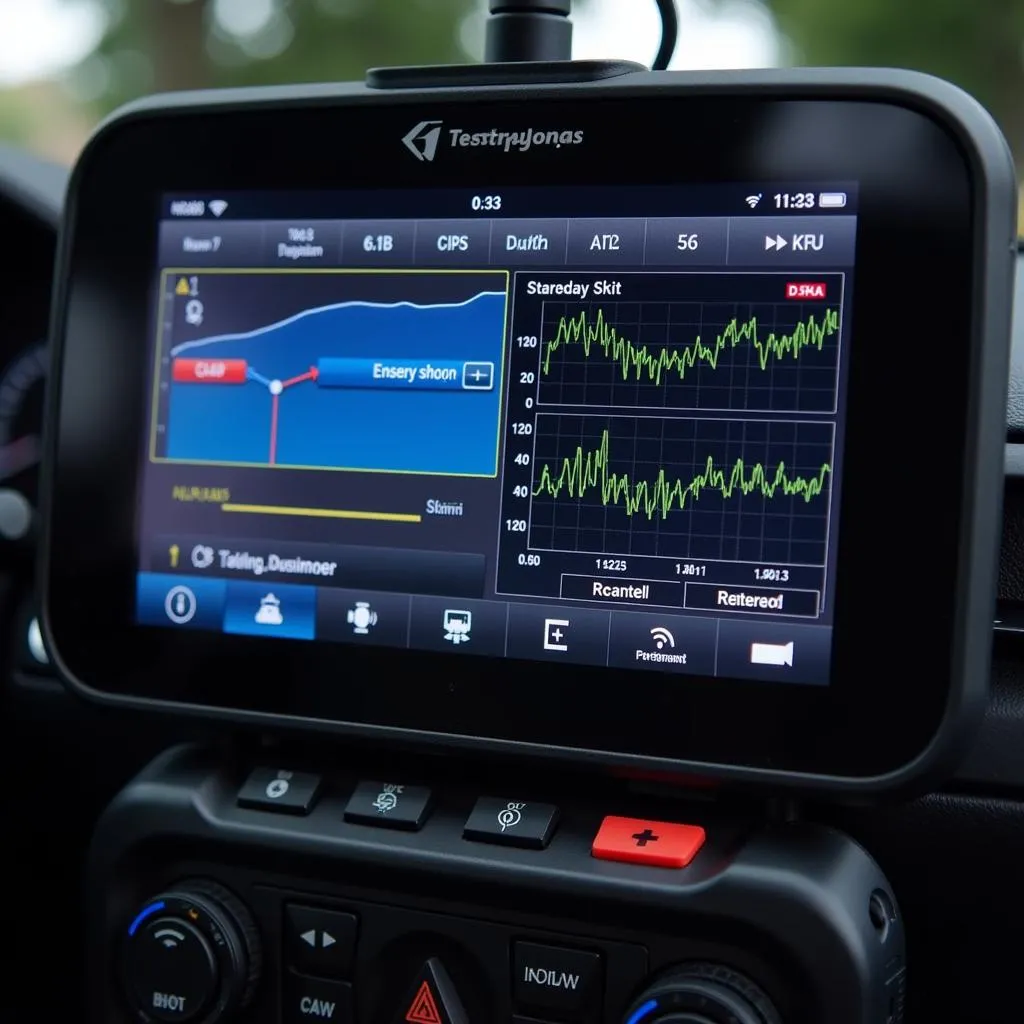Modern vehicles are technological marvels, powered by intricate computer systems that control everything from engine performance to safety features. When a problem arises, pinpointing the cause can feel like searching for a needle in a haystack. This is where a professional auto diagnostic tool steps in, revolutionizing the way mechanics diagnose and repair vehicles.
Why are Professional Auto Diagnostic Tools Essential?
Gone are the days of relying solely on mechanical expertise and intuition to diagnose car problems. Today, vehicles generate massive amounts of data through onboard computers and sensors. A professional auto diagnostic tool acts as the bridge between these complex systems and the technician, providing a wealth of information that would be impossible to obtain otherwise.
Here’s why these tools are indispensable in the modern automotive landscape:
-
Accurate Diagnosis: Professional-grade tools offer a level of accuracy far exceeding basic code readers. They delve deeper into the vehicle’s systems, reading and analyzing data from various modules, including the engine, transmission, ABS, airbags, and more. This precision minimizes guesswork and ensures the correct repair is performed the first time.
-
Time Savings: Time is money, especially in the fast-paced world of auto repair. Diagnostic tools drastically reduce diagnostic time by quickly identifying the problem area. This allows mechanics to focus their efforts on the actual repair, increasing efficiency and customer satisfaction.
-
Advanced Functionality: Beyond basic code reading, professional tools offer a plethora of advanced features. These include live data streaming to monitor system performance in real-time, bi-directional communication to activate components for testing, and access to manufacturer-specific information and procedures.
-
Enhanced Professionalism: Utilizing cutting-edge diagnostic tools portrays a professional image to customers. It demonstrates a commitment to staying current with technology and providing the highest quality service.
 Mechanic using a professional auto diagnostic tool to diagnose a car problem
Mechanic using a professional auto diagnostic tool to diagnose a car problem
Key Features to Look for in a Professional Auto Diagnostic Tool
Investing in the right diagnostic tool is crucial for any automotive professional. Here are key features to consider:
-
Vehicle Coverage: Ensure the tool covers a wide range of makes and models, including both domestic and foreign vehicles. Some tools specialize in specific manufacturers, while others offer broader coverage.
-
Software and Updates: Regular software updates are essential to stay compatible with new vehicle models and evolving technologies. Consider tools with frequent updates and user-friendly software interfaces.
-
Durability and Design: Choose a tool built to withstand the demands of a busy shop environment. Durability, ergonomic design, and a clear, easy-to-read display are crucial for daily use.
-
Technical Support and Training: Reliable technical support and comprehensive training resources are invaluable, especially for navigating complex diagnostic procedures or troubleshooting tool-related issues.
-
Data Management: Advanced tools often include data logging and reporting capabilities, allowing mechanics to track vehicle history, generate repair reports, and streamline their operations.
How Professional Auto Diagnostic Tools are Changing the Industry
The impact of professional diagnostic tools extends beyond individual repair shops. They are shaping the automotive industry as a whole:
-
Increased Specialization: As vehicle systems become more intricate, specialized diagnostic tools tailored to specific areas like transmissions, engine management, or ADAS (Advanced Driver-Assistance Systems) are becoming increasingly prevalent.
-
Data-Driven Insights: The wealth of data generated by these tools is driving advancements in predictive maintenance, enabling proactive repairs and potentially reducing long-term ownership costs.
-
Empowering DIYers: While professional-grade tools remain essential for complex repairs, the availability of user-friendly consumer-level tools is empowering DIY enthusiasts to perform basic diagnostics and maintenance tasks.
 Mechanic reviewing diagnostic data on a professional tool's screen
Mechanic reviewing diagnostic data on a professional tool's screen
Choosing the Right Tool for Your Needs
Selecting the ideal professional auto diagnostic tool depends on your specific needs and budget. Factors to consider include:
- The volume of vehicles serviced.
- The range of makes and models encountered.
- The level of diagnostic depth required.
- Budgetary constraints.
“Investing in a high-quality diagnostic tool is an investment in your business,” says John Smith, a seasoned automotive engineer with over 20 years of experience. “It not only improves diagnostic accuracy but also enhances efficiency, reduces errors, and ultimately leads to greater customer satisfaction.”
Conclusion
Professional auto diagnostic tools have become indispensable in the modern automotive repair landscape. They empower technicians with the knowledge and precision needed to diagnose and repair increasingly complex vehicles efficiently and accurately. As technology continues to evolve, these tools will only become more sophisticated, further revolutionizing the way we maintain and repair our vehicles.
FAQs
1. What is the difference between a professional auto diagnostic tool and a code reader?
While code readers can retrieve basic diagnostic trouble codes (DTCs), professional tools offer more in-depth analysis, live data streaming, bi-directional control, and access to manufacturer-specific information.
2. Are professional auto diagnostic tools difficult to use?
Many tools feature user-friendly interfaces and intuitive software. However, a basic understanding of automotive systems and diagnostic procedures is recommended. Training resources are often available from tool manufacturers.
3. Can I use a professional auto diagnostic tool on my own car?
Yes, but keep in mind that these tools are designed for professional use. While helpful for DIY enthusiasts, certain repairs may still require specialized equipment or expertise.
4. How often do professional auto diagnostic tools need software updates?
Software update frequency varies by manufacturer, but it’s generally recommended to update the tool regularly, ideally whenever new updates are released, to ensure compatibility with the latest vehicle models and technologies.
5. What kind of technical support is available for professional auto diagnostic tools?
Most reputable manufacturers offer technical support via phone, email, or online resources. Some also provide training courses and certification programs.